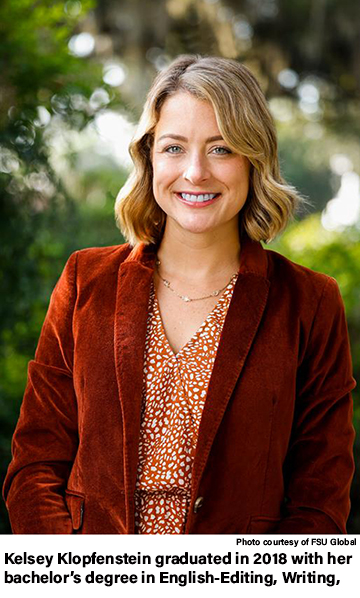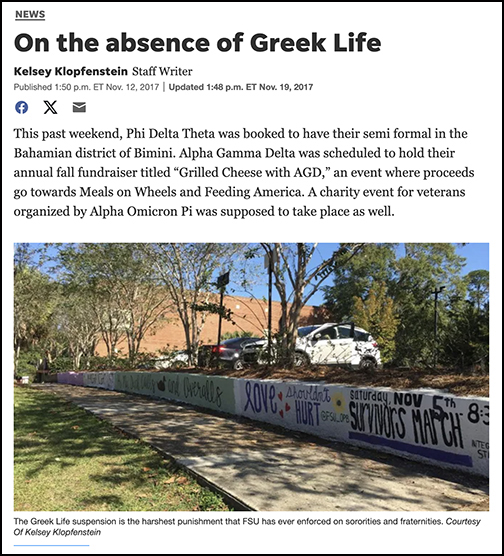Alumna Kelsey Klopfenstein stayed close to home for college, starting a track that led to her position as Global Media Manager
By Amaris Falcon
Kelsey Klopfenstein’s journey from Tallahassee native to Tallahassee Community College Eagle to Florida State University alumna and now to the position of Global Media Manager for the Office of University Communications at FSU is one of legacy, fate, and pride.
“It feels like I’m where I’m meant to be and doing what I’m meant to do,” she says.
Klopfenstein attended Lawton Chiles High School in northeast Tallahassee, and after her graduation in 2013, enrolled at what was then Tallahassee Community College to earn her Associate of Arts degree. She talks highly about her time there and the positive environment at the school, which is now known as Tallahassee State College.  Klopfenstein thought pursuing a two-year degree was a nice way to buffer the process of being positive about her future plans.
Klopfenstein thought pursuing a two-year degree was a nice way to buffer the process of being positive about her future plans.
“I wasn’t entirely sure what I wanted to do with my life yet, but I still wanted to work toward a degree,” she says. “Earning my A.A. in two years from TSC (formerly TCC) allowed me to try courses in different disciplines so I could figure out what I wanted to study for my bachelor’s degree.”
Three years later, when she faced a decisive moment to pick an academic path at FSU, Klopfenstein reflected on her relation to the media and communications field through her mother’s career in advertising. She says that connection with her mom, coupled with four years of TV production experience in high school “influenced me to apply to the Media Communication Studies Program” in FSU’s School of Communication.
In addition to FSU, Kelsey applied to other schools' media and communication programs, but her decision to attend FSU was something of fate. Even after receiving acceptance letters from other colleges, none of them felt particularly right. So, she stayed in her hometown.
But how did Klopfenstein end up majoring in English at FSU?
When her academics did not align with the School of Communication’s admission requirements, her advisor explained to her the benefits of “FSU’s journalism degree,” i.e., English-Editing, Writing and Media.
Klopfenstein recalls her first thought being something along the lines of, “Hmmm, English?” After discussing with her advisor the connections between English and media that the track offers, though, she agreed to apply. Her father, having also been an English major at FSU, was ecstatic about this turn of events for his daughter.
She was accepted into her dad’s major of choice, and Klopfenstein says the decision just felt right. She graduated with her bachelor’s degree in 2018, along with a minor in French.
She then worked for a little over four years as a news writer-media specialist for the Office of University Communications, before she became the first person to fill the position of Global Media Manager at FSU. FSU created the Global Media Manager position in March of 2023, and Klopfenstein says the title encompasses a variety of international communications.
“The position was created to streamline and promote all things international associated with FSU, which covers a lot,” she says, explaining that FSU Global encompasses many entities across campus but there are four units she works with closely: the Center for Global Engagement, International Programs, the Learning Systems Institute, and the Center for Intensive English Studies. (More information about each unit is included at the end of the article.)
To me, writing is a group process. There’s no way to do it alone. Just because someone edits something doesn’t mean it’s not original work. It’s still the original author’s piece, but with a new perspective to consider.
— Kelsey Klopfenstein
Klopfenstein says all four units are essential contributors to the internationalization of FSU, but the concept of FSU Global encompasses almost every unit on-campus. From the College of Music sending a group of students on tour throughout Costa Rica to the Department of Modern Languages and Linguistics offering Ukrainian language courses this fall and the football team playing in Ireland, her day-to-day schedule of handling the coverage of so many topics under that large umbrella “varies on the day, and I kind of love it like that,” she says.
The coolest part of her job is everything she has learned and all the people she has met. In her position, she adds, “the world comes to me.”
Many of her undergraduate experiences integrate into her current work as well. A large part of Klopfenstein’s current job is to figure out what stories appeal to her audience and enhance FSU’s mission, interview a variety of people for those assignments, and then write the articles.
Klopfenstein praises her many editing classes at FSU and the journalism experience she gained working with the FSView & Florida Flambeau, an independent college newspaper, and with The Kudzu Review, FSU’s undergraduate journal of literature and art. Those experiences taught her many of the skills she uses daily, she says.
As an undergraduate, Klopfenstein submersed herself in media and journalism studies as much as possible. She was a staff writer for the FSView she became a creative nonfiction editor at Kudzu, and she speaks favorably about her participation in both, highlighting the strengths she gained from each publication.
 Klopfenstein credits the FSView for increasing her knowledge of FSU’s history as well as the ins and outs of the screening processes of journalism. She underlines one particular experience, when in November of 2017, when she covered then-FSU President John Thrasher’s suspension of Greek life activities following the death of a fraternity pledge. Klopfenstein still recalls how much news-oriented knowledge and perspective she acquired interviewing involved parties during the months the ban was in effect.
Klopfenstein credits the FSView for increasing her knowledge of FSU’s history as well as the ins and outs of the screening processes of journalism. She underlines one particular experience, when in November of 2017, when she covered then-FSU President John Thrasher’s suspension of Greek life activities following the death of a fraternity pledge. Klopfenstein still recalls how much news-oriented knowledge and perspective she acquired interviewing involved parties during the months the ban was in effect.
Her work for Kudzu, Klopfenstein says, differed from the newspaper, for obvious reasons, such as content variety. Her responsibilities at the journal taught Klopfenstein “how to edit and how not to,” skills that included regulating the author’s creative freedom and empowering their voice while also bettering the piece overall.
“To me, writing is a group process,” she says. “There’s no way to do it alone. Just because someone edits something doesn’t mean it’s not original work. It’s still the original author’s piece, but with a new perspective to consider.”
Klopfenstein advises English majors hoping to pursue a news-writing career post-graduation, to “be professional, but with a personal touch.” She also reminds students not to let mistakes discourage them.
“We’re all just human and we all have a job to do,” she says. Mistakes, she adds, are a healthy part of the process and an opportunity to learn and grow.
Klopfenstein has now completed another major phase in her own continuing development as a journalist, a writer, an editor, and as an individual. She plans to graduate with her master’s degree in media and communication studies from FSU in the spring of 2025. As she speaks about her upcoming accomplishment, Klopfenstein says she will consider the conclusion of that academic chapter as “coming full circle.”
And for her, for now, that feels just right.
FSU Global units
The Center for Global Engagement provides orientation, immigration advising, and ongoing support to more than 2,400 international students on F1 & J1 visas and family members, as well as to more than 250 international scholars and faculty. The CGE also offers a variety of educational, social and cultural programs throughout the year, such as International Coffee Hour, Global Café, the Global Citizenship Certificate and the Engage You World Speaker Series.
Klopfenstein points out that Global Exchanges program structure is more culturally immersive than a typical study abroad experience because students attend classes at a host university alongside local students and other international exchange students from around the world.
International Programs is the study abroad sector for FSU. IP operates study centers in London, Valencia and Florence, a branch campus in the Republic of Panama, and faculty-led programs in places such as Croatia, Czech Republic, Switzerland, France and Kosovo.
Klopfenstein explains that studying abroad through IP and going on a global exchange are two great but very different experiences.
“Students who study abroad through IP are either studying at one of the study centers with hundreds of other FSU students or participating in a program led by an FSU faculty member with a group of FSU students,” she says. “Students who go on a global exchange take classes at one of FSU’s 45-plus partner universities alongside local students and are usually there by themselves or with a handful of other FSU students. Both experiences are an opportunity for students to participate in cultural immersion while earning their degree from FSU.”
The Learning Systems Institute is a global research branch at FSU that develops innovative solutions and methods to improve the learning and performance of organizations and individuals globally. Several of LSI’s current projects include the Teacher Excellence Initiative in Egypt, the Advancing Basic Education in the Philippines Activity, and a teacher training partnership in Indonesia.
The Center for Intensive English Studies is an English language school that prepares international students for success at English-speaking universities. In addition to its intensive English program and English for academic purposes program, CIES also administers the Teaching English as a Foreign Language certificate.
Amaris Falcon is an English-Editing, Writing, and Media major, with a second major in communication and a minor in textile entrepreneurship.
Follow the English department on Instagram; on Facebook; and on X.
